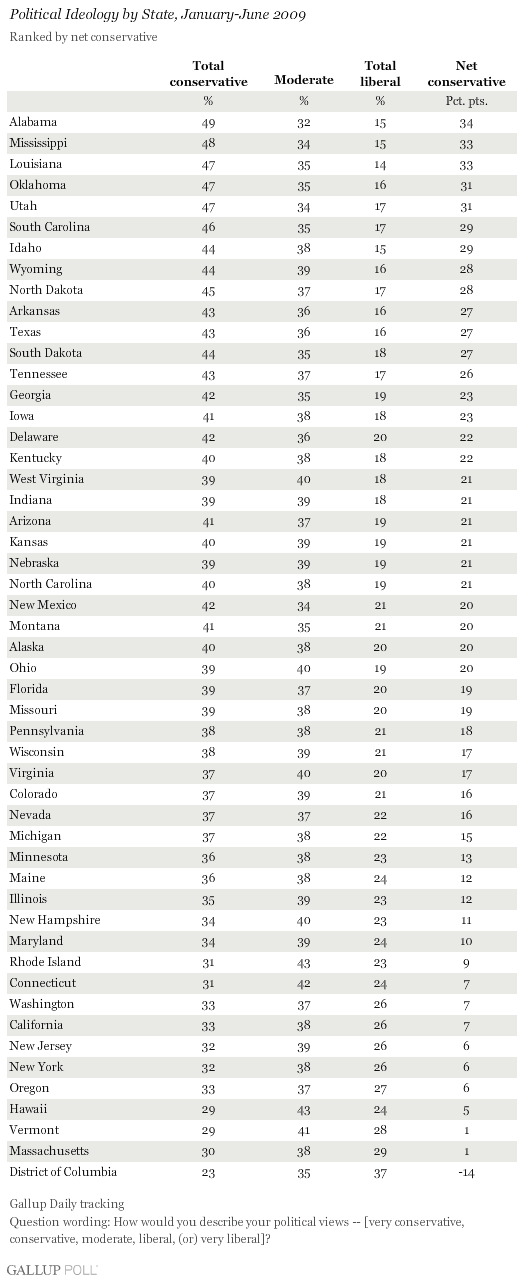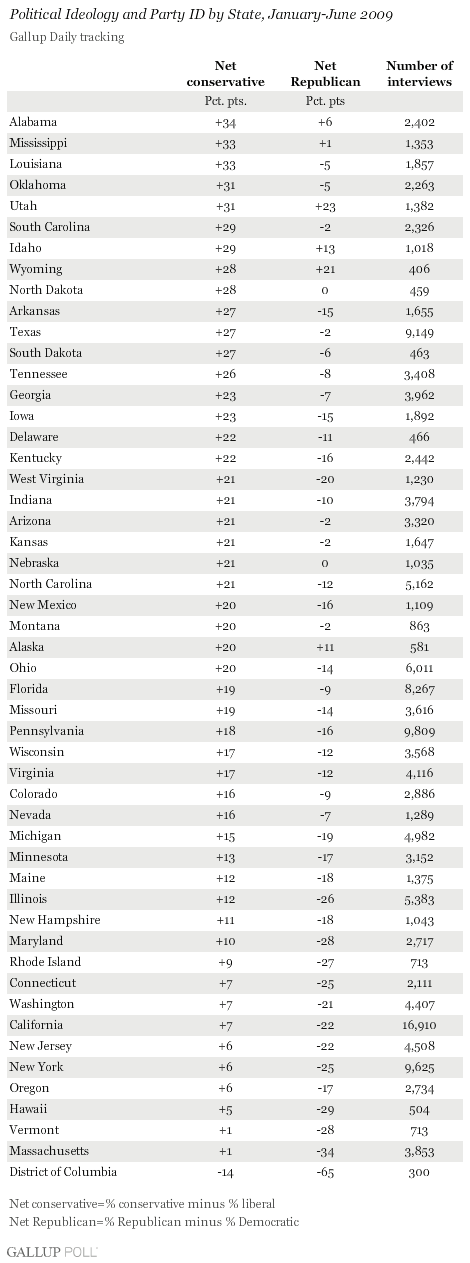PRINCETON, NJ -- The strength of "conservative" over "liberal" in the realm of political labels is vividly apparent in Gallup's state-level data, where a significantly higher percentage of Americans in most states -- even some solidly Democratic ones -- call themselves conservative rather than liberal.
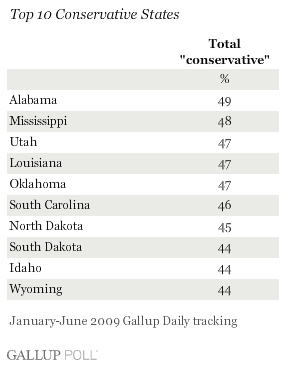
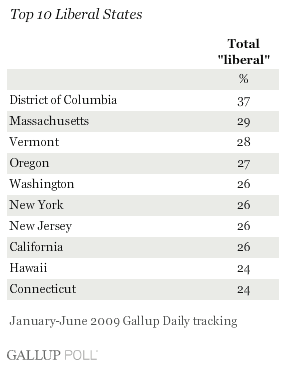
The most conservative states are found primarily in the South, led by Alabama and Mississippi. The figure approaches 50% in several Southern states, plus Utah. The most liberal states tend to be the on the East and West coasts, led by Washington, D.C., and then Massachusetts, Vermont, and Oregon.
These findings are based on Americans' answers to a question asking whether their political views are very conservative, conservative, moderate, liberal, or very liberal. The data come from Gallup Daily tracking in the first half of 2009, encompassing interviews with more than 160,000 U.S. adults, with a minimum of 400 interviews for each state (and 300 in the District of Columbia).
The overall percentages of self-declared conservatives in each state range from a high of 49% in Alabama to a low of 23% in the nation's capital. The "liberal" label is embraced most widely in D.C., by 37%, followed by 29% in Massachusetts. At 14%, it is used least commonly in Louisiana. (See table at end of this report for complete state-by-state percentages.)
Because the percentage of moderates varies by state -- from 43% in Hawaii and Rhode Island down to 32% in Alabama -- the percentage identifying themselves as "conservative" does not by itself provide a complete picture of the relative strength of conservatism across states. For this reason, the "net conservative" statistic -- defined as the total percentage calling themselves conservative minus the total percentage defining themselves as liberal -- is used in the accompanying map to identify the ideological makeup of each state.
States where the conservatives' advantage over liberals is greater than 25 percentage points are defined as Most Conservative. Net conservatism registering 20 to 25 points is defined as More Conservative; from 10 to 19 points, as Somewhat Conservative; and from 1 to 9 points, as Less Conservative. Only Washington, D.C., which has more liberals than conservatives, is defined as Liberal.
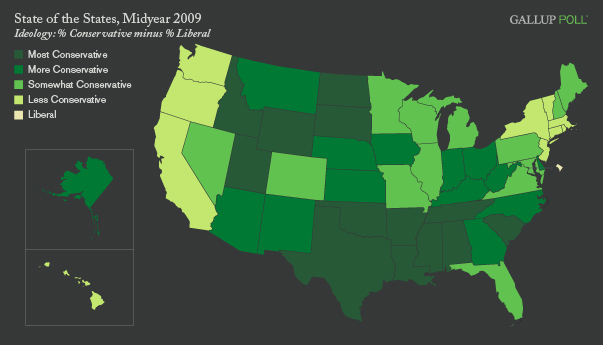
While Americans' party identification and political ideology are related, they are by no means one and the same. For instance, while residents of Alabama and Mississippi are the most likely to be conservative ideologically, they are not the most Republican in their party affiliation. According to Gallup's report on party identification by state earlier this month, that distinction goes to Utah, whose net conservative score is only slightly higher than that of South Dakota (a Democratic-leaning state).
In fact, while all 50 states are, to some degree, more conservative than liberal (with the conservative advantage ranging from 1 to 34 points), Gallup's 2009 party ID results indicate that Democrats have significant party ID advantages in 30 states and Republicans in only 4.
Bottom Line
Despite the Democratic Party's political strength -- seen in its majority representation in Congress and in state houses across the country -- more Americans consider themselves conservative than liberal. While Gallup polling has found this to be true at the national level over many years, and spanning recent Republican as well as Democratic presidential administrations, the present analysis confirms that the pattern also largely holds at the state level. Conservatives outnumber liberals by statistically significant margins in 47 of the 50 states, with the two groups statistically tied in Hawaii, Vermont, and Massachusetts.
When considered with party identification, these ideology findings highlight the role that political moderates currently play in joining with liberals to give the Democratic Party its numerical advantage.
Gallup.com's "State of the States" series reveals state-by-state differences on political, economic, and wellbeing measures Gallup tracks each day, based on data collected between January and June 2009. To see all stories published in the midyear 2009 series, click here. New stories will be released throughout the month of August.
Survey Methods
Results are based on telephone interviews with 160,236 national adults, aged 18 and older, conducted Jan. 2-June 30, 2009, as part of Gallup Daily tracking. For results based on the total sample of national adults, one can say with 95% confidence that the maximum margin of sampling error is ±1 percentage point.
The margin of sampling error for most states is ±3 percentage points, but is as high as ±7 percentage points for the District of Columbia, and ±6 percentage points for Wyoming, North Dakota, South Dakota, Delaware, and Hawaii.
Interviews are conducted with respondents on land-line telephones (for respondents with a land-line telephone) and cellular phones (for respondents who are cell-phone only).
In addition to sampling error, question wording and practical difficulties in conducting surveys can introduce error or bias into the findings of public opinion polls.
